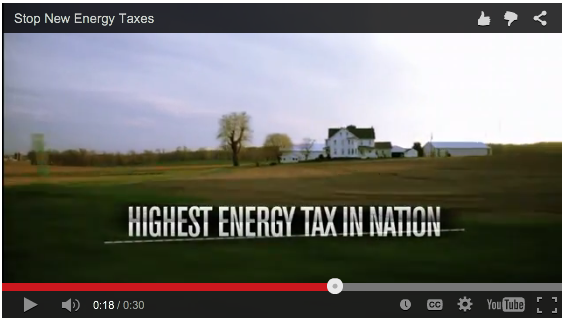Industry launches new TV ad opposing shale tax
-
Susan Phillips
The battle over Governor Wolf’s shale gas tax proposal took an acrimonious turn last week with dueling letters between the industry and the governor. Now the television ads have arrived.

screenshot
The Pennsylvania Chamber of Commerce and Industry began running TV spots opposing Governor Wolf’s shale gas tax.
The Pennsylvania Chamber of Business and Industry, which leads a coalition of groups opposing the shale gas tax, has begun running an ad against Governor Wolf’s proposal in the Pittsburgh, Harrisburg and Wilkes Barre/Scranton media markets. The TV spot, launched Monday, is part of the Chamber’s “Stop New Energy Taxes” campaign, an effort to beat back Wolf’s plan to tax Marcellus Shale production at five percent, with an additional 4.7 cents per thousand cubic feet.
Wolf says it will bring in $1 billion, much of which will be funneled toward education. The industry ad doesn’t mention education, but instead says it will cost “tens of thousands of jobs,” be the “highest energy tax in the country,” and “…even worse the money will be sent to Harrisburg, instead of critical local projects.”
So how accurate is the ad?
That last point is a nod to the impact fee, which is Pennsylvania’s current version of a shale gas tax, most of which gets funneled back to towns in gas drilling areas. It brought in $224 million in 2013 and is popular for the injection of cash it provides rural communities. Wolf says that money won’t go away, because part of the severance tax will replace the impact fee.
The jobs claim comes from a study funded by the American Petroleum Institute earlier this month. API projects the governor’s tax will result in 1,364 fewer wells over the next decade, resulting in a cumulative drilling investment loss of $11.5 billion to the state. The Governor’s spokesman Jeff Sheridan called the study “misleading.”
When it comes to the claim that Wolf’s proposal would be “the highest energy tax in the country,” that’s when the number-crunchers rule.
In addition to the five percent tax on the value of the shale gas produced, and the 4.7 cents per thousand cubic feet, there’s a tax floor when it comes to calculating the shale gas tax bill. Wolf proposes a minimum value of $2.97 per thousand cubic feet of natural gas, regardless of its actual sale price, to hedge against fluctuations in price. That means that if natural gas were selling at $1 per thousand cubic feet, the effective tax rate would not be 5 percent, it would be almost 20 percent.
Historically, the price of natural gas has fluctuated wildly and right now, it’s pretty much at a low-point. The Chamber’s spokeswoman Tricia Harris says according to Platts, an analysis firm that tracks prices, the most recent average contract price of natural gas for Pennsylvania producers was $1.10 per thousand cubic feet (Mcf). So if the price of natural gas were $1/Mcf, then an effective tax rate of 20 percent would be the largest tax rate for energy production in the nation.
But that’s not taking into account the many different ways that states tax oil and gas. That’s also assuming that the price will continue to stay so low. It’s a pretty steep curve that flattens out at about $2.50/Mcf. If the price of natural gas rises to $2.75 per thousand cubic feet, then the effective tax rate, which is different than revenue collected, would be 7.1 percent. That would beat the Texas rate of 7.5 percent. (Texas also exempts much of its shale gas wells from paying any tax rate.)
The more one tries to make comparisons between states, the more squishy the tax rates become.
But one thing Wolf continues to hammer home is that Pennsylvania remains the only gas-producing state that does not have a tax based on production. And he says that’s left too much money on the table while the schools go bankrupt.
“That’s why Governor Wolf has proposed a reasonable severance tax modelled after our neighbor, West Virginia,” wrote Wolf’s spokesman Jeff Sheridan in an email. “Corporate interests continue to fight to protect oil and gas companies instead of the well-being of our children. The reality is that members from both parties in the legislature and a majority of Pennsylvanians support a severance tax, and schools across the state desperately need the funding to invest in classrooms to prepare our children to succeed in today’s economy.”
In Wolf’s proposal, the severance tax would also help fund the Department of Environmental Protection and energy efficiency grants. He also wants to use some of the funds to relaunch the Pennsylvania Sunshine solar program.
The state budget is required to be passed by June 30th. According to the Chamber, the ads are running for the next couple of weeks. But TV viewers may be seeing more as the budget deadline gets closer.
















